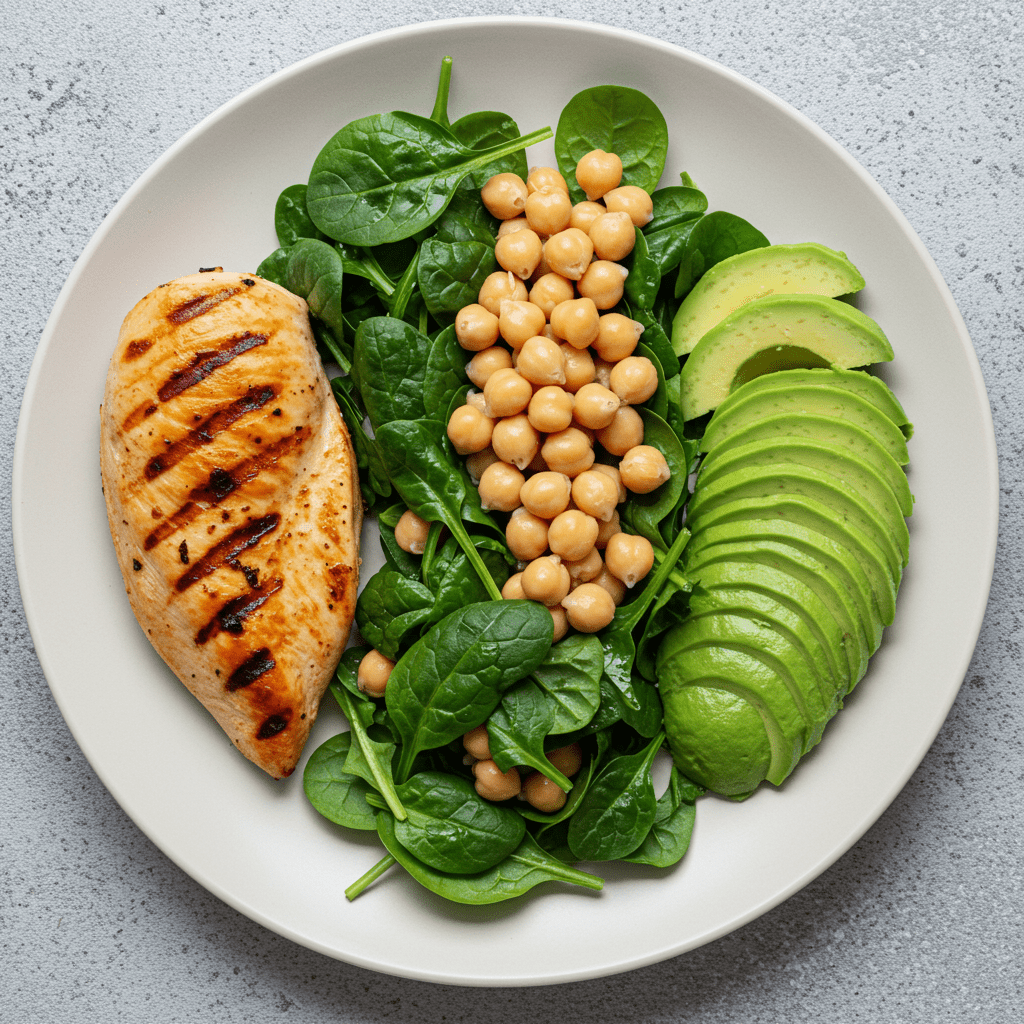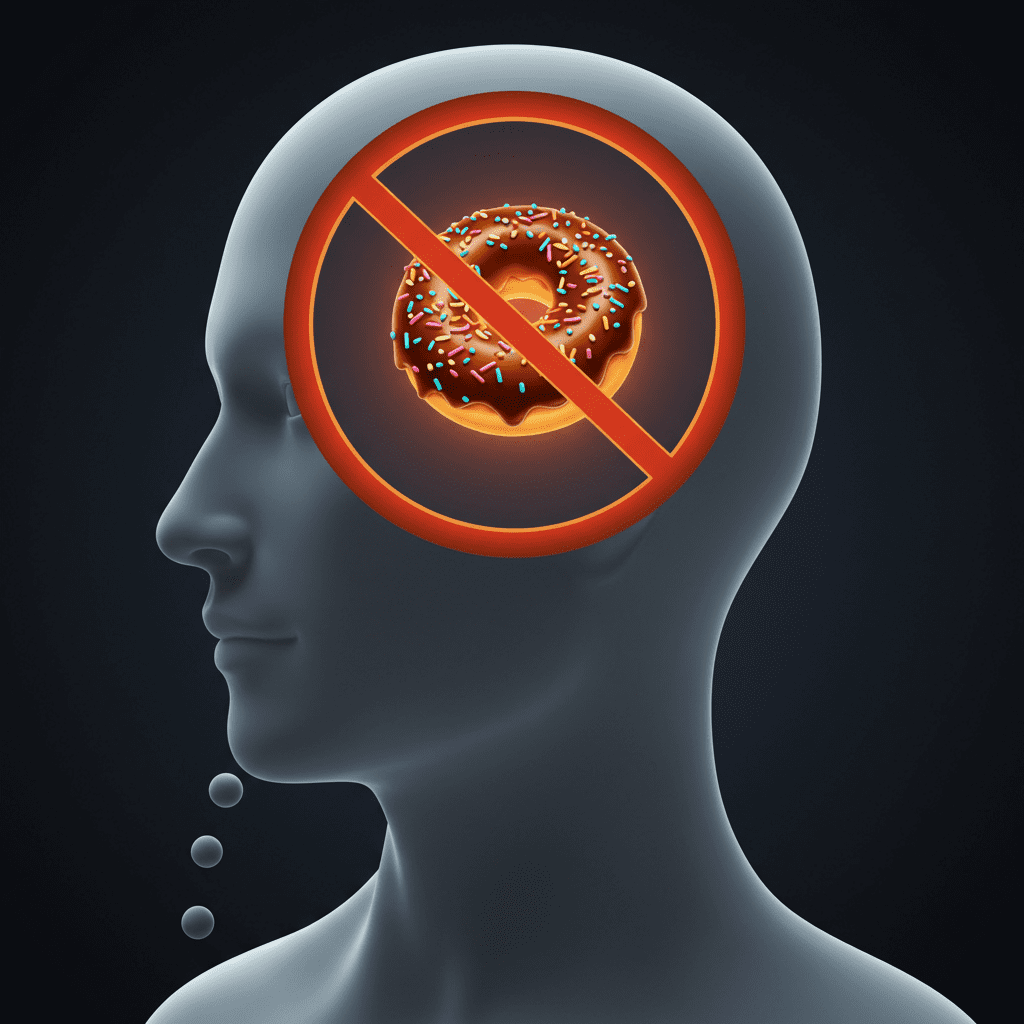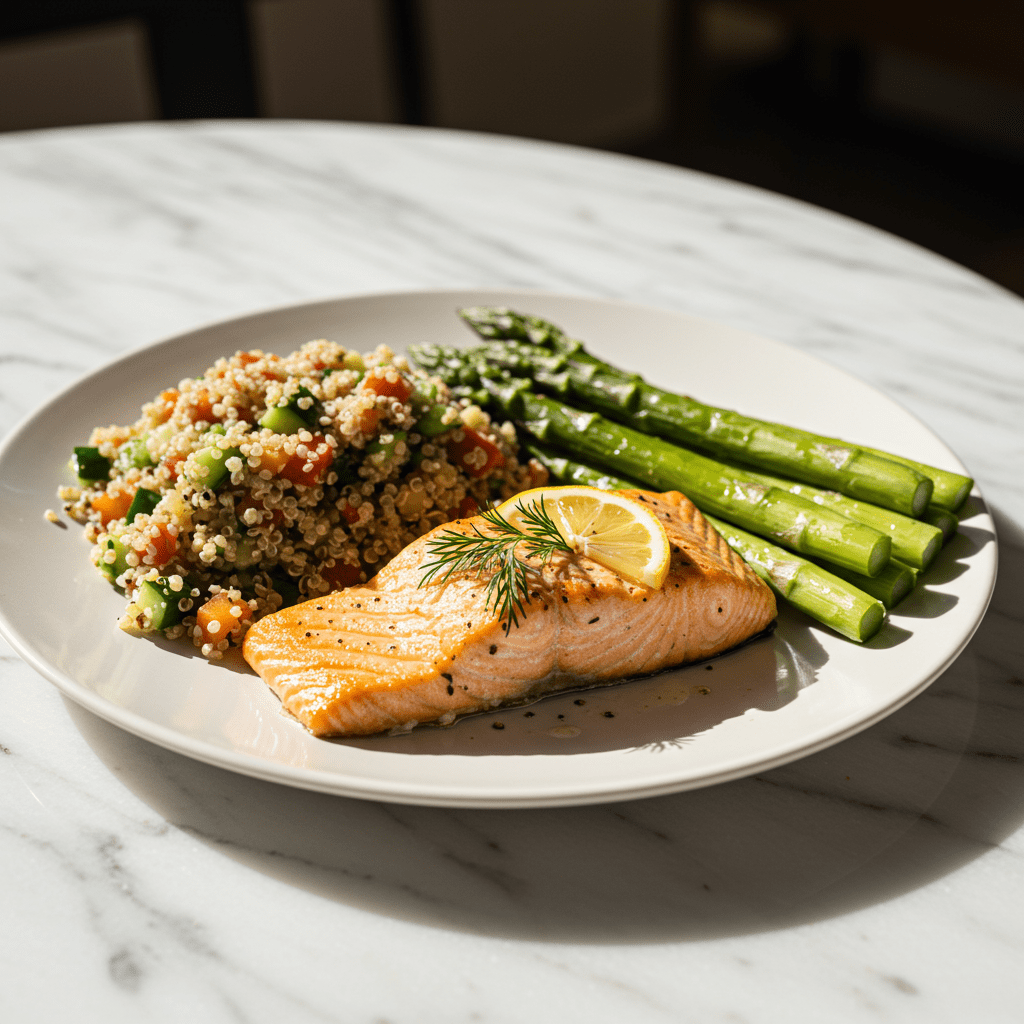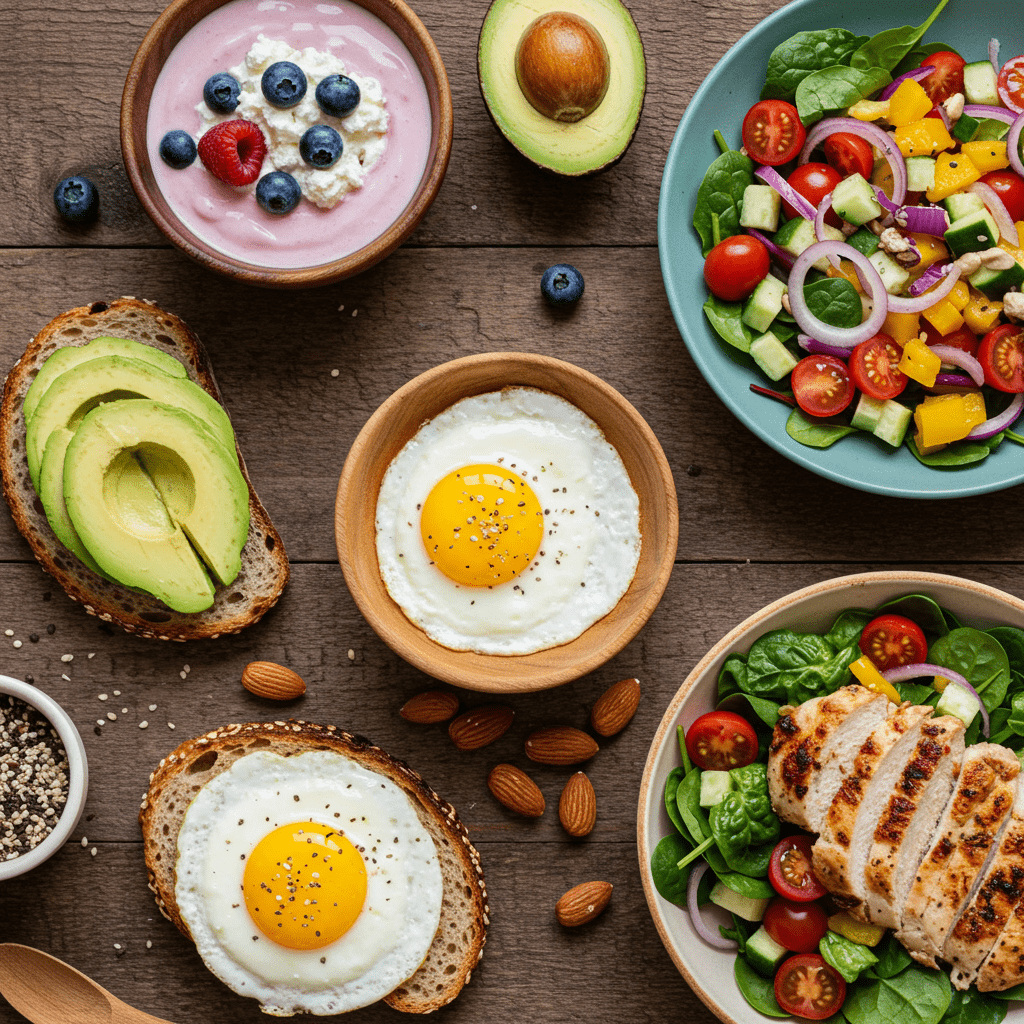Why Am I Always Thinking About Food? A Dietitian’s Guide to Finding Peace

Does it feel like your brain is a 24/7 food channel you can’t turn off? You think about what you just ate, what you’ll eat next, and what you shouldn’t have eaten.
If these thoughts are consuming your mental energy, please know you’re not alone, and it’s not a matter of willpower. My name is Jamie, and as a Registered Dietitian with over a decade of experience, I’ve guided countless people through this exact struggle.
Constant food thoughts are often a symptom, not the root problem. They’re a signal from your body or mind that something is out of balance.
In this guide, we’ll compassionately investigate these signals together, moving beyond the frustration to find practical, sustainable solutions for food peace.
- First, Is Your Body Just Asking for Fuel?
- The Science of Satiety: How Protein, Fiber, and Fat Keep You Full
- How Dieting Can Make Food Thoughts Worse
- Are You Feeding Your Feelings? The Emotional Connection
- Your Best Tool for Food Peace: Practice Mindful Eating
- What If It’s a Deeper Issue? When to Seek Help
- How Sleep and Stress Hijack Your Hunger Signals
- Conclusion
First, Is Your Body Just Asking for Fuel?

Before we explore complex psychological factors, let’s start with the most fundamental reason for food thoughts: actual, biological hunger. Your body is designed for survival, and its primary way of signaling a need for energy is by making you think about food.
This can happen for a few key reasons:
- You’re Not Eating Enough: This seems obvious, but in a culture that often promotes eating less, many people are chronically under-fueling their bodies without realizing it. If you’re skipping meals or your portions are consistently too small, your body will ramp up hunger hormones like ghrelin, essentially shouting for the energy it needs. According to the Cleveland Clinic, ghrelin’s main job is to stimulate appetite, and when you restrict calories, its levels rise significantly.
- Your Meals Lack Staying Power: You might be eating enough calories, but if your meals aren’t balanced, they won’t keep you full. A snack of simple carbs might give you a quick energy burst, but it will likely leave you hungry again in an hour. True satisfaction comes from a combination of protein, healthy fats, and fiber. Building a truly filling meal is key.
- You’re Choosing Unsatisfying ‘Diet’ Foods: Swapping a fulfilling meal for a low-calorie substitute that you don’t actually enjoy can backfire. Your body might have received some calories, but your brain remains unsatisfied, leading to persistent cravings for the ‘real thing’ you wanted in the first place.
The Science of Satiety: How Protein, Fiber, and Fat Keep You Full

To quiet down food noise, building meals that promote satiety—the feeling of being full and satisfied—is crucial. This isn’t about dieting; it’s about nutritional science.
The three key players in satiety are protein, fiber, and fat. Research consistently shows that meals rich in these nutrients are more effective at keeping hunger at bay.
- Protein Power: Protein is widely considered the most satiating macronutrient. A 2015 review in the American Journal of Clinical Nutrition found that higher protein diets increase satiety and can help reduce overall food intake. It works by influencing several appetite-regulating hormones. I generally recommend clients aim for 20-30 grams of protein per meal, which you can find in recipes like a hearty ground chicken chili.
- The Fullness of Fiber: Fiber, particularly soluble fiber found in oats, beans, and apples, slows down digestion. This means food stays in your stomach longer, promoting a prolonged feeling of fullness. The Harvard T.H. Chan School of Public Health highlights fiber’s role in stabilizing blood sugar levels, which prevents the energy crashes that can trigger cravings and obsessive food thoughts.
- Healthy Fats for Satisfaction: Fat is not the enemy. In fact, it’s essential for absorbing certain vitamins and is incredibly effective at promoting satiety. Healthy fats, like those in avocados, nuts, seeds, and olive oil, trigger the release of hormones that tell your brain you’re full. Including a source of healthy fat in your meals adds flavor and satisfaction, helping to prevent you from feeling deprived.
How Dieting Can Make Food Thoughts Worse

Have you ever decided to cut out carbs, only to find yourself fantasizing about a warm loaf of bread all day? This is a classic example of the psychological backlash from dieting.
When you label a food as ‘bad’ or ‘off-limits,’ you inadvertently give it more power. This phenomenon is supported by what’s known as the ‘ironic process theory’—when you actively try not to think about something, you often end up thinking about it even more.
Restrictive dieting is one of the biggest culprits behind obsessive food thoughts for several reasons:
- It Creates Scarcity: Your brain is wired to want what it can’t have. By forbidding certain foods, you make them seem more desirable and rewarding, setting yourself up for intense cravings.
- It Ignores Biological Needs: As the famous Minnesota Starvation Experiment of the 1940s showed, prolonged calorie restriction leads to a profound psychological preoccupation with food. Participants became obsessed with recipes, dreamed about eating, and showed a dramatic increase in food-related thoughts. This is a survival mechanism, not a personal failing.
- It Fosters a Cycle of Guilt and Bingeing: The intense cravings caused by restriction often lead to ‘giving in.’ This is followed by feelings of guilt and shame, which can trigger more restrictions, creating a vicious and exhausting cycle.
Are You Feeding Your Feelings? The Emotional Connection

Sometimes, the thought of food isn’t about physical hunger at all; it’s a response to an emotional need. Emotional eating is using food to self-soothe, distract, or cope with feelings other than hunger.
While it’s perfectly normal to find comfort in food occasionally, it becomes problematic when it’s your only coping mechanism. According to the American Psychological Association, identifying the underlying feeling is the first step to breaking the cycle.
Are you feeling…
- Stressed? Food, especially high-fat, high-sugar options, can provide a temporary feeling of calm by activating reward centers in the brain.
- Bored? Eating can provide a brief distraction and stimulation when you’re under-stimulated or procrastinating.
- Lonely or Sad? Food can act as a stand-in for connection or comfort, providing a temporary sense of fullness when you’re feeling empty inside.
Recognizing these patterns is not about judgment. It’s about gathering information. Once you know your triggers, you can start building a more robust emotional toolkit.
Your Best Tool for Food Peace: Practice Mindful Eating

Mindful eating is the practice of paying full attention to the experience of eating and drinking, both inside and outside the body. It’s the opposite of distracted, rushed eating in the car or in front of the TV. Research has shown that practicing mindful eating can decrease binge eating and help you better recognize your body’s natural hunger and fullness cues. It’s a skill that helps you reconnect with your body’s wisdom. Here’s how to start:
- Remove Distractions: Sit at a table. Put your phone away, turn off the TV, and close your laptop. Give your meal the attention it deserves.
- Engage Your Senses: Before taking a bite, look at your food. Notice the colors, shapes, and smells. As you chew, pay attention to the textures and flavors.
- Chew Thoroughly: It sounds simple, but we often swallow our food almost whole. Chewing slowly not only aids digestion but also gives your brain time to register that you’re eating, which is key for satiety signals to kick in.
- Check In with Yourself: Halfway through the meal, pause. Take a breath. Ask yourself, ‘How is my hunger now?’ This simple check-in helps you notice when you’re becoming comfortably full, rather than eating on autopilot until you’re stuffed.
What If It’s a Deeper Issue? When to Seek Help

For some, persistent and intrusive thoughts about food, weight, and body image can be a sign of disordered eating or a diagnosable eating disorder. It’s crucial to recognize that these are serious, life-threatening mental illnesses, not lifestyle choices.
According to the National Eating Disorders Association (NEDA), some warning signs can include:
- An intense preoccupation with weight, food, calories, and dieting.
- Feelings of guilt and shame associated with eating.
- Following a rigid set of food rules, regardless of hunger.
- Withdrawing from social situations that involve food.
- Compulsive exercise.
If these patterns resonate with you, please know that you are not alone and help is available. Trying to solve this by yourself can be incredibly difficult and often counterproductive. A team of professionals, including a therapist specializing in eating disorders and a registered dietitian, can provide the compassionate, evidence-based support you need to heal.
You deserve to live a life free from the distress of food obsession.
How Sleep and Stress Hijack Your Hunger Signals

Lifestyle factors play a huge role in regulating your appetite and, consequently, your food thoughts. Two of the biggest culprits are lack of sleep and chronic stress.
- The Sleep-Appetite Connection: When you’re sleep-deprived, your body’s hormone production goes haywire. Research from Johns Hopkins Medicine and the National Institutes of Health shows that lack of sleep leads to a decrease in leptin (the hormone that signals fullness) and an increase in ghrelin (the hormone that signals hunger). This hormonal imbalance makes you feel hungrier and less satisfied by what you eat, often leading to intense cravings for high-calorie foods.
- Stress and Cravings: Chronic stress causes your body to produce high levels of the hormone cortisol. Elevated cortisol can trigger cravings for ‘comfort foods’—typically those high in sugar and fat. This is an evolutionary response designed to make sure you have enough energy to deal with a perceived threat. But in modern life, where stress is often work or relationship-related, this response can lead to a cycle of stress-induced eating and further food preoccupation.
Prioritizing 7-9 hours of quality sleep and developing stress-management techniques like meditation, yoga, or spending time in nature can have a direct and powerful impact on reducing unwanted food thoughts.
Conclusion
Constant thoughts about food are rarely about a lack of discipline. They are a meaningful signal that something in your physical or emotional world needs attention.
By learning to listen with curiosity instead of judgment, you can begin to untangle the ‘why’ behind the noise. Whether it’s nourishing your body with balanced, satisfying meals, building a toolkit to cope with emotions, rejecting the restrictive rules of dieting, or prioritizing sleep, you have the power to change your relationship with food.
This journey is about finding freedom, not enforcing more rules. Be patient and compassionate with yourself.
True well-being is a life where food takes its rightful place as a source of nourishment and pleasure, not a constant, stressful preoccupation.
